- Home
- Regan Walker
A Secret Scottish Christmas (Agents of the Crown Book 4) Page 25
A Secret Scottish Christmas (Agents of the Crown Book 4) Read online
Page 25
“Since this is a fishing town, there will be salmon and cod, some of it smoked. As I recall, the inn serves a tolerably good mutton stew and doubtless they’ll have roast chicken. Breakfast will be oatmeal, girdle scones and eggs. Oh, and I believe they have a kaleyard and will have stored some greens for winter use.”
Muriel fought the urge to frown.
Aileen chuckled. “There is always the inn’s shortbread to look forward to. Their cook bakes some of the best in all of Kincardineshire.” Leaning in to whisper, she added, “I say that because our cook in Arbroath claims her shortbread is the best in Forfarshire.”
The girl laughed and her cheeks, red from the cold, made her lovely eyes appear bright.
“It is good to see you laugh again, Aileen. I feared your somber countenance of the past several days would become permanent.”
“I must apologize for being so sullen.”
“You had reason enough. I don’t suppose you have forgiven your young man yet?”
“He is not my young man, Muriel, and no,” she said, biting her lip and gazing toward the blue waters of the harbor, “I have not.”
Perhaps, thought Muriel, she could accomplish more if she reminded Aileen of her humanity. “Have you never deceived someone for the sake of what you believed was a good purpose?”
The girl looked down at her feet. After a moment, she said, “… I deceived my parents into thinking I’d given up my desire to design ships, while I never did.”
“And did they forgive you?”
Aileen looked up, her eyes smiling now. “Aye, they did, and today my father is glad for my persistence if not my deceit. But Nash’s deception was not the same. I believed we had confided our hearts to each other, yet not once did he mention his spying. Worse, what he and Robbie did could have led to someone’s death, including their own!”
“Indeed, it was despicable!” Muriel carefully observed the girl’s face for any sign of agreement. When she didn’t see it, she went on, hoping to get Aileen to defend the young man. “Not telling your brother and Emily was terribly wrong, but not to speak a word of it to you was outside of enough.”
The girl chewed her bottom lip, fingering a long strand of her hair. “Maybe he couldn’t say anything. Might they have been sworn to secrecy?”
“Very possibly.” Muriel inwardly smiled, happy her plan to turn Aileen into Nash’s defender was working. “Have you asked him about that?”
Aileen looked up with a guilty expression. “No…”
“I have discovered that it is best to settle disagreements early while there is still a chance to do so. Perhaps it would be best to put behind you the mischief Nash and his brother undertook for that rascal Sidmouth. You don’t have to marry the man just because you allow him back into your good graces.”
Aileen gave her a sharp glance. “He has said nothing to me of marriage.”
“Perhaps not, but an old matchmaker like me can see from the way he looks at you, the subject is on his mind.”
They arrived at the front door of the inn behind the rest of their company. William turned to face them. “The Ship Inn is entirely ours through New Year’s, so make yourselves at home. I will introduce to you to Mr. Cruickshank, the proprietor, and he will see you are escorted to your chambers. There are no plans for today except for dinner but, tomorrow, the adventurers among us assail the castle!”
As she stepped through the door of the inn, the first thing Muriel noticed was the warm air on her chilled face. She inhaled the pleasant smell of wood burning in the large fireplace she glimpsed through the doorway on her right, which appeared to lead to a common room.
Two servants accepted their coats, cloaks, gloves and hats and one ushered them into the well-appointed room where the rest of their party had gathered before the fire. Muriel could see it was not a place to dine but almost a parlor with upholstered chairs, a sofa and small tables perfectly sized for a cup of tea. “How very nice this is,” she remarked to her companion.
“I did tell you the inn would be comfortable,” Aileen reminded her.
“So you did.” Muriel glanced out the large windows that provided a splendid view of the cerulean blue bay where the Albatross floated, its sails neatly furled.
A tall pleasant-looking man of middle years with brown hair and spectacles entered the room. At his side the auburn-haired William Stephen. “Allow me to present Mr. Cruickshank, the inn’s proprietor and our host for the time we are here.”
Mr. Cruickshank inclined his head. “’Tis an honor to have you as our guests. I assure you the employees of the inn and I will do all we can to make your stay with us an enjoyable one.”
An attractive young woman came to his side. The proprietor put his arm around her shoulder. “This is my daughter, Fiona. As a widower, I have come to rely upon her as hostess in all things concerning our guests. You will find her competent and willing to assist with your needs.”
The girl, who could not have been over twenty, smiled at their company, but quickly diverted her gaze to the two Powell twins, the only unaccompanied men among them. Fiona had the same brown hair as her father but her eyes were blue and her lovely face featured a dimple in each cheek that showed themselves when she smiled.
Muriel instantly sensed Aileen had competition.
“We’ve some hot tea, brandy and mulled claret to warm you,” Fiona offered. Her voice was the soothing, seductive kind men favored with just a hint of a Scottish accent.
Oh, my yes, definitely competition.
At Fiona’s words and, to the great happiness of the assembled guests, two male servants glided into the room carrying trays bearing cups, fragrant steam rising from them.
Muriel accepted a cup of the mulled claret, which, upon tasting, she found to be quite good. “I begin to thaw,” she muttered.
Aileen took a cup from the tray, but did not raise it to her lips. Instead, she held the cup between her hands, her attention fixed on the proprietor’s daughter talking to the Powell twins. “I should have remembered sweet Fiona,” Aileen said.
Muriel took another sip of the spicy wine. “My dear, it would appear you have a rival.”
Later that day, having changed her gown and allowed Rhona, who had accompanied them north with a few of the other maids, to comb the tangles from her hair, Ailie ventured downstairs. The dining room was empty save for Will and Emily.
Will looked up from the sideboard where he was pouring a drink. The inn had set out bottles of sherry, wine and brandy with an array of glasses for them. “Come join us,” he urged. “Can I pour you a glass of sherry?”
“Good eve to you both. Aye, that would be most welcome. I’ll just warm myself by the fire.” She stepped nearer to the blazing fire and stretched her hands toward the flames. Even with the fireplaces well tended, the rooms of the inn could be chilly.
She had always liked this room, a testimony to life at sea, decorated as it was with flags and pennants from various ships, a fancy carved transom with a unicorn, the heraldic symbol of Scotland, and various cutlasses and weapons of the past. Over the fireplace between two sconces was a painting of a seventeenth century sixty-gun warship, its sails billowing with wind and its stern flying a Scottish red ensign.
Like the inn’s common room, this one looked out on the harbor. She turned from the fire to gaze beyond the windows to the waters of the small bay turned lavender blue by the setting sun. The sky above them glowed a pale salmon color, making the harbor altogether magical in appearance.
Emily carried two glasses of sherry to Ailie and handed one to her. “Wasn’t it thoughtful of the proprietor to combine the tables into one long one for us?”
“Aye, it was. That way all of our guests can hear Grandfather’s tales of the castle ghosts.”
Muriel swept into the dining room just then, a white feather rising above the jeweled band around her head.
“You look refreshed, Muriel,” remarked Emily.
Muriel accepted a glass of Madeira from Will. “Thank y
ou. I had a bit of a lie down, which has left me feeling wonderful. All that sea air, I expect.”
The others began filtering into the dining room. When Nash and Robbie appeared on the threshold, Ailie’s gaze immediately darted to Nash. His eyes met hers in a questioning look. Her heart ached for want of him. She decided being at odds with the man you love is dreadful.
He headed straight for her. “Ailie—”
“Would you like something to drink?” Fiona purred, as she rushed to his side, her dimples on display.
“Thank you, brandy would be fine,” he said, never taking his eyes off Ailie. When Fiona had gone, he began again. “Ailie, I need to speak to you, but not here.”
Her heart was in her throat, afraid of what he might say. “If you must.”
The conversations around them grew boisterous as Nash’s green and gold eyes stared into hers. A longing to rush into his arms came over her but, reminded of his deception, she resisted.
Before he could reply, Fiona returned with Nash’s brandy. “Is there anything else you might like, sir?”
Thankfully, Ailie’s grandfather strode into the room at that moment to welcome everyone to Stonehaven. His appearance took her aback. For the fancy attire he wore, he might have just stepped into her father’s drawing room in Aberdeen. His blue velvet coat paired with Ramsay blue tartan trews made his blue eyes shine and gave him a distinguished bearing. Even his white cravat appeared expertly tied. Ailie felt certain he had dressed for Muriel and the thought made her smile.
Her grandfather bowed before Muriel. “Guid eve’nin’ tae ye, Countess.”
“Mr. Ramsey, how gallant you look,” replied Muriel. “You must sit near me at dinner. I am anxious to hear your stories of the ghosts at the castle we’re to see tomorrow.”
“I can tell ye some tales.” Her grandfather surveyed the table, appearing to count chairs. “Och! There be thirteen places. ’Tis nae lucky.”
“Good sir,” came Muriel’s reply. “I would much prefer an odd number at dinner, even if it be thirteen, else I feel like I’m entering the ark.”
Ailie’s grandfather laughed. “Ye’re a one, Muriel. Verra weel, I shall brave the bad fairies tae please ye.”
Ailie glanced toward the windows to see the sky had darkened to a deep violet. With all the people gathered in the dining room, the air was warm enough to cause steam to appear on the windows, leaving little to see except for the few lights onboard the two ships in the harbor.
“Let’s warm ourselves by the fire,” Nash suggested. She followed him to the fire steadily burning above glowing coals. He drank his brandy and she sipped her sherry, more conscious of him than anyone else in the room.
“You may not have forgiven me, Ailie,” Nash said in a low voice, “but I’ll be keeping you close till you do.”
“You’ll have a long wait,” she blurted. But even as she said the words, she could feel her resolve to stay angry with him ebbing away.
When the others began to take their seats, Nash motioned to two chairs across the table from where Muriel and Ailie’s grandfather had just taken a seat. “Sit with me, Ailie.”
She nodded and followed him.
Once everyone was seated, beneath the table, Nash took her hand, brushing his thumb over her knuckles, causing an enticing shiver to ripple through her. She recognized his gesture as an invitation to reconcile and, though she was tempted to decline, she did not withdraw her hand.
The dinner the inn served was a fine baked cod with mustard sauce and chicken roasted with sage and thyme. Even knowing it would all be splendidly cooked, Ailie had little appetite. Her disagreement with Nash had robbed her of an appetite. Still, she managed to appear as if she would eat, adroitly moving the chicken about her plate.
Nash hadn’t eaten either. She inclined her head toward him. “You aren’t hungry?”
“Not very. I’ve much on my mind.”
Did he, too, hate the distance between them?
Toward the end of the meal, which Ailie only picked at, Fiona and two male servants entered carrying plates of warm shortbread. “We’ve tea and port for you if you like,” said the pretty girl, as she set a plate of shortbread before Nash.
Muriel took a bite of the shortbread. “Oh my. This is quite wonderful.”
Ailie glanced at Nash, wanting desperately to be close to him again. “Here’s something we can agree upon,” she said, picking up a piece of shortbread with her free hand. “It melts in the mouth.”
In a low voice, discernable only to her, he said, “I’m happy to eat it with one hand.”
In truth, Ailie would gladly forego dessert for the comfort of his touch. It wasn’t like any other man’s touch. And it wasn’t just the powerful attraction she felt for him. Holding Nash’s hand made her feel like a ship moored in home port.
Ailie’s grandfather pushed aside his empty plate, took up his wine and, with Muriel’s encouragement, began to speak of Dunnottar.
The conversations around them died as he recited the words of the poem by Mrs. Carnegie:
“High on a rock, half sea-girt, half on land,
The castle stood, and still its ruins stand
Wide o’er the German main the prospect bent,
Steep is the path and rugged the ascent:
There hung the huge portcullis—there the bar
Drawn on the iron gate defied the war.”
Her grandfather took a swallow of his wine. “Many wars have come and gone an’ still Dunnottar stands, a broodin’ fortress, aye, but nae alone. Her ghosts are many and they dinna sleep. ’Tis guid ye willna be visitin’ her at night when the witches burned at Dunnottar cry from the cliffs.”
Kit looked up with a fearful glance at Ailie’s grandfather. “Witches?”
Will nodded. “In the sixteenth century, several were seized in Aberdeen and burned at Dunnottar. Lord only knows the torture they endured before their deaths.”
In a voice Ailie was certain was designed to add to the mood of the evening, her grandfather intoned, “The anshent ruins speik wi’ a loud voice. Every turret ha’ a tongue. Ye may nae see a spectre, still, ye’ll hear their screams. ’Tis as if the verra walls remember.”
Will leaned in, the flickering candle casting shadows on his face and his auburn hair. “A woman is said to wander about in a green tartan dress. No one knows who she is.”
Emily, who Ailie knew had never visited the castle, drew close to her husband, a frightened expression on her lovely face. “So many ghosts?”
Will wrapped his arm around his wife’s shoulders. “Aye, Leannan, and there’s more of the wee ghosties. The spectre of a young deerhound runs about the castle grounds, looking, they say, for his master. A Norseman frequents the guardroom at the main entrance yet if you were to follow him, he would vanish. And near the cave entrance leading from the sea, a soldier, dressed in military regalia from some past era, stares out to sea as if watching for a ship.”
Grandfather Ramsay turned to Muriel. “Ye still be wantin’ tae see it, Countess?”
“Oh yes,” she said. “You’ll not frighten me away so easily!”
Ailie’s grandfather laughed. “Then I shall take ye meself an’ we’ll see if we can find a ghostie or two.”
Ailie glanced out the large windows. Outside, night had descended and inside, the fire had burned to smoldering remnants, the candles now mere stubs. Shadows lurked around the room, calling up images of the ghosts they had spoken of. It was not difficult to believe that not far away stood an ancient castle where those same ghosts still roamed. In her mind, she could imagine them; she could hear their wails.
Nash must have sensed her disquiet, for he squeezed her hand. Her heart, which had been beating rapidly as Angus and William had spoken of ghosts, calmed as Nash’s warmth and strength flowed into her. He was her anchor to all that was real. But could she forgive his deception?
Into the eerie silence, Robbie uttered the words that made everyone laugh. “Well, ain’t it fortunate they’re all de
ad?”
Chapter 21
30 December, Stonehaven
After a sleepless night, Nash had come to the dining room early, grateful for the hot coffee Fiona handed him. He did not feel up to returning her smile. Instead, he idly pushed his eggs about his plate, all desire for food having deserted him as he considered how to handle his stubborn Scottish lass.
Ailie was his or would be when he sorted all this out. She could not deny the passion between them. The fire was there, smoldering beneath all that had happened. He had only to rekindle it.
She might have decided to go to London but, if he were successful, she would greet the ton on his arm.
Robbie and the rest of their company filed in a short while later, complaining of dreams haunted by Dunnottar’s ghosts. Angus had come for breakfast and claimed the chair next to Muriel.
Ailie had yet to appear.
Nash knew he had taken a risk when he reached for her hand the evening before, but she had not pulled away. It had taken all his resolve to keep from dragging her outside and reminding her of the passion and the love that lay between them.
“Says here tensions are running high in Glasgow,” said William, poring over the Stonehaven Journal, the newspaper Angus had brought with him. “The weavers are none too happy.”
Angus paused in the act of his lathing butter on a scone. “’Tis nae over yet.”
Muriel looked up from her chocolate. “I do hope they do nothing foolish.”
“If they do, they’ll be in for it,” predicted William. “The yeomanry is still camped around the city.”
“Can I see that?” Robbie asked. William handed him the paper and returned to his omelet.
Nash glance at his brother as Robbie pulled his spectacles from his pocket and, careful not to scrape his healing wound, put them on. He still wore the small bandage. Nash had the impression he did so not because it was necessary but to hide the ugly scar forming on his temple.
Robbie bent his head to the paper. “Good Lord, according to this, it’s getting worse. Won’t be pretty if Sidmouth decides to make an example of Glasgow’s weavers.”

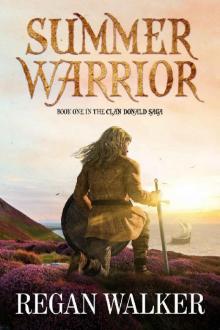 Summer Warrior (The Clan Donald Saga Book 1)
Summer Warrior (The Clan Donald Saga Book 1) Echo in the Wind
Echo in the Wind Once Upon a Christmas Past
Once Upon a Christmas Past A Secret Scottish Christmas (Agents of the Crown Book 4)
A Secret Scottish Christmas (Agents of the Crown Book 4)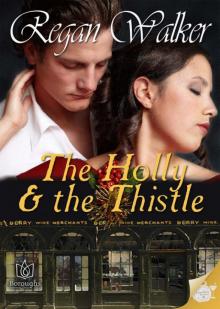 The Holly and the Thistle
The Holly and the Thistle Racing with the Wind (Agents of the Crown)
Racing with the Wind (Agents of the Crown) Wind Raven (Agents of the Crown)
Wind Raven (Agents of the Crown) Rebel Warrior (Medieval Warriors #3)
Rebel Warrior (Medieval Warriors #3) King's Knight (Medieval Warriors Book 4)
King's Knight (Medieval Warriors Book 4)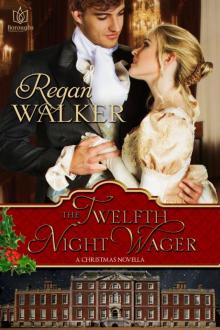 The Twelfth Night Wager
The Twelfth Night Wager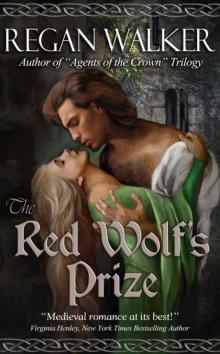 The Red Wolf's Prize
The Red Wolf's Prize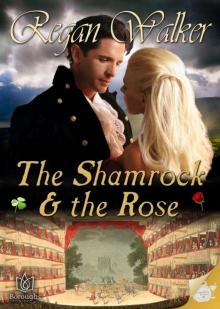 The Shamrock & the Rose
The Shamrock & the Rose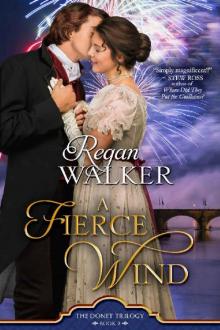 A Fierce Wind (Donet Trilogy Book 3)
A Fierce Wind (Donet Trilogy Book 3) Against the Wind (Agents of the Crown Book 2)
Against the Wind (Agents of the Crown Book 2)